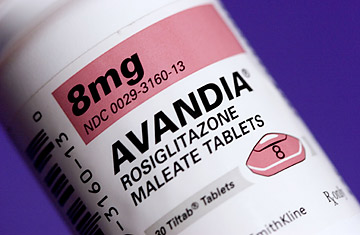
New studies link the diabetes drug Avandia to heart disease risk.
The bad news keeps coming for patients taking the controversial diabetes drug Avandia (rosiglitazone). Two new studies released Monday, June 28, confirm earlier data linking the drug to a higher risk of heart disease in diabetes patients.
One analysis found that elderly patients taking Avandia, which is made by GlaxoSmithKline, had an 18% higher combined risk of heart attack, stroke, heart failure or death from any cause than those taking Actos (pioglitazone), a competing drug made by Takeda Pharmaceuticals. A second study reported a 28% increased risk of heart attack among patients taking Avandia, compared with those taking either placebos or other diabetes drugs.
The studies were released ahead of publication by the Journal of the American Medical Association (JAMA) and the Archives of Internal Medicine because of their relevance to an upcoming Food and Drug Administration (FDA) meeting on July 13-14 at which experts will review safety data on Avandia and discuss regulatory action.
Dr. Steven Nissen, a cardiologist at the Cleveland Clinic and the author of one of the new studies, has long studied the heart risks of the drug. Based on the latest analysis, he believes the drug should be withdrawn from the market since the Type 2 diabetes patients who rely on Avandia are already at high risk for heart attack and heart-related death.
GlaxoSmithKline maintains that its drug is safe and notes in a statement that data from six recent controlled clinical trials "show that Avandia does not increase the overall risk of heart attack, stroke or death."
Nissen was one of the earliest and most vocal critics of Avandia, publishing the first study, in May 2007, to describe the higher heart risks among Avandia users and helping launch a congressional investigation into the drug's safety and its approval and monitoring process at the FDA.
Because of those efforts, in June 2007 the FDA required GlaxoSmithKline to place a black-box label — the strictest safety warning the agency utilizes — on Avandia to alert consumers of its heart risks. (The same warning was required of Actos, which belongs to the same class of drugs.) With the warning in place, that July an FDA advisory panel reviewed Avandia's safety and voted overwhelmingly to recommend that the agency keep the drug on the market, despite its risks.
Since then, however, several major studies (including another by Nissen) have confirmed Avandia's heart risks or shown Actos to be significantly safer. Once a $3-billion-a-year drug, Avandia has seen its sales begin to decline, in part because some doctors and patients have started to question its safety.
Now two new studies further assail the troubled drug. The JAMA analysis, led by Dr. David Graham, a drug-safety officer at the FDA, included more than 227,000 diabetes patients age 65 or older who were enrolled in Medicare between July 2006 and June 2009 and were followed for three years. The study compared the risks of taking Avandia to those of taking Actos; both drugs, used primarily to treat Type 2 diabetes, increase the body's ability to respond to insulin, which helps keep blood-sugar levels in check.
